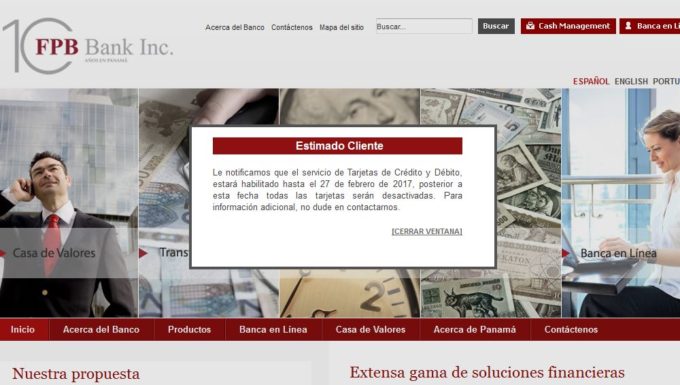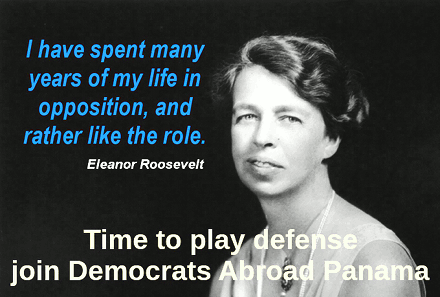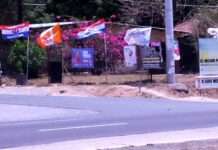
FPB Bank and brokerage: the Odebrecht
scandal hits Panama’s banking district
by Eric Jackson
At the end of the business day on Friday, February 10, the Banking Superintendency of Panama ordered the takeover of BNP Bank Inc. In tandem with that the Securities Markets Superintendency of Panama suspended the bank’s brokerage license. The reason later given to Telemetro News by the secretary general of the Banking Superintendency, Gustavo Villa, was that the bank was linked to the monumental Lava Jato scandal that began in Brazil but has now spread to many countries. Villa said that given the circumstances it would be too risky to allow a voluntary liquidation, that the most prudent thing was to appoint someone in whom the superintendency has confidence to take over while deliberations and possibly litigation ensues about what will happen to the bank.
The bank is relatively tiny in the scheme of things, with some $134 million reportedly on deposit and a stated capitalization of $13 million. The intervening authorities will have to verify and quantify before it would be possible to let people recover their money in bank or brokerage accounts.
Prudent investors and depositors would have already run away from the bank with their money. The institution could have been noted in the Panama Papers revelations of early 2016. The bank was mentioned early on in the raucous and still ongoing related scandal about Maltese public officials’ covert offshore financial dealings. Also early in 2016, the banking superintendency here issued an opinion — a warning, really — that said that it was acceptable for FPB Bank to rely on the Brazilian firm Serasa Experian to vet their Brazilian banking clients, but it was not OK for the bank to just insert notes in their files saying that said customers checked out with the Serasa Experian in lieu of inserting the actual reports from that company.
The big red warning flag came last July, when Brazilian police and prosecutors, looking for evidence in a bribery and bid rigging scandal involving the construction centered conglomerate Odebrecht and the Braskem chemical company that was a partnership between the Brazilian state-owned Petrobras oil company and Odebrecht, stumbled across records referring to both the Panama-based multinational law firm Mossack Fonseca and to FPB Bank. Brazilian authorities quickly concluded that both the law firm and the bank were running money laundering operations. Panama was promptly informed but the government and legal system here took no immediate action.
The president and legislature in Panama had, at the time, just passed a law with a provision that whatever criminal activities that foreign courts might find, none of their judgments would affect any company’s standing to bid for or hold contracts with the Panamanian government. It was an Odebrecht protection law and widely said to be that at the time.
What Brazilian law enforcement people say that they found and heard where contradictory stories calling into question the relationship between Mossack Fonseca and the FPB Bank — the law firm signing up clients for the bank, the bank signing up clients for Mossack Fonseca, and each saying that they recruited their own clients and if those folks decided to do business with the other company it was those clients’ independent choice. There were 44 anonymous companies organized by Mossack Fonseca with accounts at FPB, with the Brazilian police having encountered the situation in the first place because some of those companies had been used by Odebrecht or its affiliated companies or persons to move money that were believed to be for the purpose of bribery. It was easy enough for Brazilian law enforcement to see a crime, because the bank is not registered to do business in Brazil, but there it was, signing up clients and helping them set up shell companies to conceal their assets, all in violation of Brazilian law.
But would somebody doing his or her due diligence about FPB Bank Inc have had to pay attention to the news to see warning flags? On the surface, the bank is anonymously owned and run. The closest their website gets is the statement that:
The Bank is supported by the entrepreneurial group of its stockholder, with more than forty years of experience in the financial market, who is part of the second generation of a Brazilian family of bankers known for exalting and sharing such values as long-term commitment, responsibility, ethics and the search for excellence.
Ignore the glaring omissions on the bank’s website and go back to the news and you may dig up references to a Brickell Group as the family of companies of which FPB Bank is a part. In a 2013 announcement by the semi-official Panamanian ANP news service, you might see some names affiliated with the bank: they were opening a new office in Panama City and on hand were bank president Eduardo Pinheiro, bank general manager José Paulucci and, as a special dignitary for the occasion, one Maílson Ferreira da Nóbrega.
Nóbrega was the Brazilian finance minister of the late 1980s who oversaw runaway inflation, which he unsuccessfully tried to control with austerity policies. He’s a man of the political right and a mover and shaker in the Brazilian high finance scene that has been moved and shaken by scandal.
Look up Pinhiero and Paulucci and you find the two names associated, but at first glance neither in Panama nor Brazil. Their LinkedIn pages and various business websites place them in the US state of Florida, in the Miami and Fort Lauderdale area. They have Brickell Management Services Inc, a Miami consulting company that claims just six employees, in common. They also have FPB Bank, which was unsuccessfully sued in Florida courts by a Mr. Cardsoso, whom they signed up as a loan guarantor in Florida for a Brazilian tourism company that went belly-up. The court said that FPB is a Brazilian bank and that the contract had a dispute resolution agreement specifying Antigua as the venue for any litigation, so that while Florida might have jurisdiction, it was inconvenient — forum non conveniens in US legal Latin — to hear the case in Florida. Such payments made on that disputed loan were made “to an FPB Bank affiliate in Miami.” Might that have been Pine Bank, of 1001 Brickell Bay Drive? Paulucci was that bank’s president and CEO. In 2006 he came to that institution from a job running the Israeli firm Bank Leumi operations in Florida, and quickly Pine Bank was hit with a cease and desist order by the US Office of the Comptroller of the Currency, which accused Pine Bank of violating various anti-money laundering provisions of the federal Bank Secrecy Act. At least six other South Florida banks were hit with similar orders at the time.
Anonymous ownership, apparently absentee management — a strange bank with which to do business, except if there is some special purpose.
And what’s in a name? “Brickell” is an upscale part of Miami and its name is on many a company, most prominently Brickell Group Construction LLC. There is The Brickell Group SA in Buenos Aires, a construction company incorporated in Argentina in 2007. Brickell is the name of a Brazilian kitchenware company. No obvious and certain relationships between these companies and the ones associated with Pinhiero and Paulucci come up in a quick online search. But then, construction and household goods made of plastic in Brazil? One might imagine some business ties with Odebrecht and its Braskem joint venture.
What about FPB? In Hong Kong the First Pacific Bank that uses those initials. FPB Bank Inc in Panama is just over 10 years old, while the bank in Hong Kong, since sold, was the property of FPB Bank Holding Company Limited, company registered in Bermuda in 1993.
“Mirror companies,” upstart firms taking on the same or similar names of better known companies elsewhere in the world, are legal in Panama and are one of the telltale indicators of possible fraud. Due diligence that finds a researched firm that mirrors somebody older and better known tells a prudent investor to run away.
~ ~ ~
These announcements are interactive. Click on them for more information.










